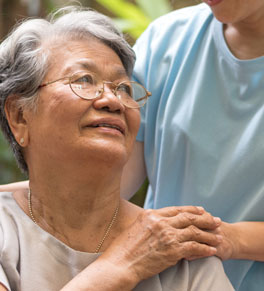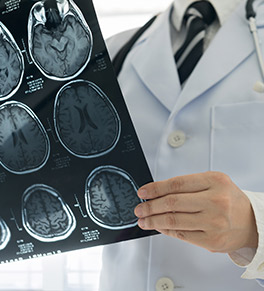
Dystonia
Dystonia is a brain disorder that manifests with abnormal twisting postures. Our movement disorder specialists can expertly diagnose and treat it.
We offer a clear path to relieve your symptoms.
Symptoms of dystonia
Dystonia symptoms vary based on the type you have but could include:
- Excessive blinking
- Involuntary pulling sensation of neck muscles
- Twisting limb movements
- Jerking motions
- Stooped or changed posture
- Tremor
- Difficulty speaking
- Dystonic muscle contractions involve:
- Most of your body
- Parts of your body, like your face or neck
- Or just smaller parts when performing specific movements
When to seek care
A trained neurologist is truly best equipped to help you manage dystonia. If you have any of these symptoms, seek medical attention from a movement disorders specialist.
Types of dystonia
There are several ways to classify dystonia. This disorder can emerge at any time, either in childhood or adulthood. Childhood-onset dystonia is usually an inherited condition. It often starts in a limb.
Focal dystonia is centered in one area. It might be task specific, only occurring when you write, play the guitar or perform specific actions in certain sports.
Segmental dystonia means the disorder has spread to adjacent muscles (your (face, neck or a whole limb).
Generalized dystonia means the muscle spasms and abnormal movements have become generalized throughout your body.
Sources of dystonia
We refer to this condition as either primary or secondary.
Doctors often view primary dystonia as having a genetic origin. Secondary dystonia emerges from an external source like stroke, trauma, toxins, the effect of some medications or an infection.
In addition, while dystonia is its own condition, it sometimes occurs as a symptom of Parkinson’s disease or other neurological conditions.
Dystonia diagnosis at UCI Health
Dystonia can be a challenging condition to diagnose and treat. During the diagnostic process, the fellowship training of our doctors helps them distinguish between similar looking movement disorders.
Some of the tests our physicians use include:
- Neurophysiological testing in our movement neurophysiology lab
- EEG (electroencephalogram)
- EMG (electromyography)
- Neurological exam
- Physical exam and medical history
- Imaging tests (MRI or CT scan)
- Genetic testing
- Blood test
- Urine test
If you have symptoms
If you experience the following, consult with your neurologist or primary doctor:
- Out of control muscle spasms
- Posturing, jerking movements
- Tremor affecting your movements or gait
They will consider referring you to the Parkinson's Disease and Movement Disorders Program at UCI Health. The best way to work with us is through an internal or external referral, and you can also call to consult with us.
Dystonia treatment at UCI Health
There are a number of different treatments for dystonia. They include:
- Oral medication
- Botulinum toxins (Botox, Xeomin, Dysport, Myobloc or Daxxify)
- Deep brain stimulation (DBS) surgery
Some dystonia patients experience muscle spasms or contractions around their eyes. In those cases, you can be treated by the Parkinson’s and Movement Disorders physicians that specialize in this condition (blepharospasm).
If we decide that you’re a good DBS candidate, we work collaboratively with our colleagues in neurosurgery. They’ll perform the DBS surgery.
Why choose UCI Health for dystonia care?
If you inquire about an innovative movement disorder treatment, either we have it or we’re open to initiating it
At this point, many neurological movement disorders are manageable, and in some cases, symptoms can abate almost completely. We pride ourselves on working with you to find ways to innovate. If you tell us about a new technology, we can invite representatives from the company or manufacturer to come educate us.
Occasionally, a patient will request a treatment they’ve read about online that is not supported by science. We won’t give you treatments that could do harm.
Otherwise, we respond fully to whatever you ask us about. If another facility currently offers a trial that we don’t, we’ll refer you there. We’re committed to getting you the most leading-edge therapies.
If dystonia symptoms make driving unsafe, telemedicine is an important option
Your first visit needs to be in-person, but then you may book your follow-up appointments online. Because of the nature of the examination we do with movement disorder conditions, we ask you to come in person at least once a year.
We have two powerful tools: membership in the esteemed research group, the Undiagnosed Disease Network, and our own Neurogenetics program
Together, these two tools give us unparalleled diagnostic capabilities. For highly complex neurological movement disorders that often resemble each other, these advanced tools help us discern and properly diagnose your condition.
We listen and we care — ask us anything
We want you to know that we hear you and care about you. Even if we are not yet capable of fully solving the medical problem, we are here as compassionate support. We treat you as we would our own family members.
We’re in constant contact with our colleagues to find consensus on the best treatment option for you. Success for us is improving your balance, quality of life and overall safety.

Don’t let dystonia overshadow your day
Work with us to make sure your diagnosis is accurate. We can get you the advanced therapies that will positively impact your quality of life.
Call 714-456-7720 for more information.

Find a neurology clinical trial
Talk to your doctor to see if a neurology clinical trial is right for you.
Featured Blog Posts

Parkinson’s disease: Knowledge is power

A 'dream come true' realized in Irvine
Dr. Michael J. Stamos once envisioned opening a small cancer center on the UC Irvine campus. What has emerged, he says, is so much more.





